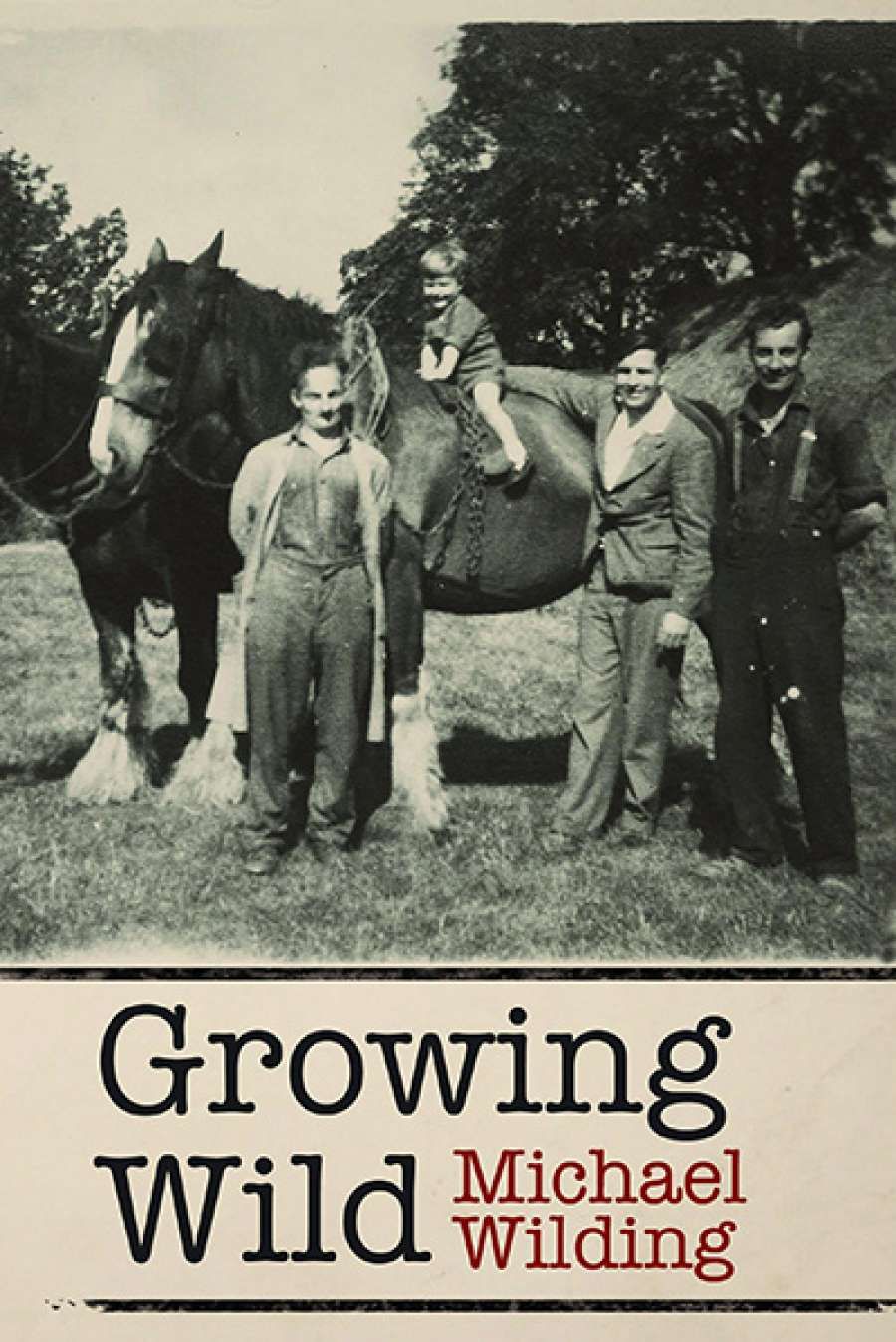
- Free Article: No
- Contents Category: Memoir
- Custom Article Title: Brian Matthews reviews 'Growing Wild' by Michael Wilding
- Custom Highlight Text:
Undaunted by Joseph Furphy's autodidactic complexities and indulgences, A.D. Hope proposed in his 1974 collection, Native Companions, Essays and Comments on ...
- Book 1 Title: Growing Wild
- Book 1 Biblio: Arcadia $39.95 pb, 302 pp, 9781925333107
Growing Wild begins in medias res 'among Leavisites' at Sydney University. You didn't have to be there, as the saying goes, to enjoy Wilding's irony, his considering approach to the phenomenon of Leavisism as he saw and encountered it, and the often hilarious anecdotes, the truth of which no doubt will be vigorously contested by any number of ageing rememberers – unsurprisingly, since Wilding so often explicitly wonders about the accuracy of his own recall and muses on possible alternatives in recounting this or that event or meeting. (It helps to have been taught by the Tomlinsons and Sam Goldberg before their move to Sydney – as I was – but Wilding doesn't need any help.)
His intermittent tentativeness – which, far from being tentative, is actually a narrative method – is especially apparent in the chapters on his early life: 'Slate', 'On the Edge of the Country', 'Midlanders', 'Grammar School'. He remembers that he 'learned to write with a slate and chalk', but the 'firm materiality of slate and frame and chalk dissolve into alternatives and ambiguities, possibilities and doubts. Uncertainties divide into proliferating choices.' In citing, sometimes quite strenuously, much that is not remembered, Wilding surrounds these absences with a gradually pieced together, diffidently proffered structure of possibilities and likelihoods that constitute an attractive or intriguing but conditional picture. And into these recollections of his boyhood and youth, at appropriate moments, he introduces a sort of riff, a rhythmic rush of memories and details undifferentiated by signific-ant pauses, which brilliantly gathers together and conjures with 'the continuing succession of words [that may be] alone of concern'. A wonderful example, too long unfortunately to quote in its full breathless, growing irritation, is the vegetable gardening sequence:
Digging alongside my father, being told how to do it, not taking too big forkfuls that I couldn't lift, nor too small that made no impression, tossing the soil over so a trench was dug, taking out by hand the bindweed, the long white roots of convolvulus that choked the plants, breaking down the clods of soil with the tines of the fork, but not breaking them down into the trench and filling it ... worms accidentally chopped in two, the wind or the drizzle chilling or dampening me, sweat making me hot, how many years of this did I go through, ten or a dozen I suppose, fuming generally, did I spend my whole childhood in fuming and resentment, sometimes when I look back on it it seems so.
 Michael Wilding at the Gangan Verlag book launch at the Goethe-Institut Sydney, 1991 (photograph by Gerald Ganglbauer, Wikimedia Commons)Nature's 'rich bounty', not humble vegetables but more exotically nuts or 'natural water cress', were the stuff of 'middle-class children's books [and] seemed to belong to another fantasy world'. Still, 'depleted' though they may have been, there had been in his rural boyhood some connections with the rich past, and he records their loss with a poignant regret that threatens to become rage but is both sharpened and contained by that same marvellous command of rhythm and register that distinguished the 'riff': 'Now the blackberries rot on the bushes as the cars sweep past the lanes, laden with frozen desserts from Marks and Spencer's and Sainsbury's and Tesco's and all the other emporia of alien, deracinated international financiers.'
Michael Wilding at the Gangan Verlag book launch at the Goethe-Institut Sydney, 1991 (photograph by Gerald Ganglbauer, Wikimedia Commons)Nature's 'rich bounty', not humble vegetables but more exotically nuts or 'natural water cress', were the stuff of 'middle-class children's books [and] seemed to belong to another fantasy world'. Still, 'depleted' though they may have been, there had been in his rural boyhood some connections with the rich past, and he records their loss with a poignant regret that threatens to become rage but is both sharpened and contained by that same marvellous command of rhythm and register that distinguished the 'riff': 'Now the blackberries rot on the bushes as the cars sweep past the lanes, laden with frozen desserts from Marks and Spencer's and Sainsbury's and Tesco's and all the other emporia of alien, deracinated international financiers.'
Wilding's account of his involvement with the anti-Vietnam war protests and, especially, the Push, and the 'sheer variety and range of people who were attracted by the ambience' is witty, exciting, and precise, with little of the earlier memory vagueness (there goes my 'theory of memoir'). He names names, quotes conversations ('You and your grubby student friends', Frank Moorhouse complains to him), describes his own and others' feats of what he calls critical drinking, as distinct from the Push's espousal of critical thinking, and generally tracks bondings, break-ups, and boozings, including his own, with gusto, mostly good humour, and the undercurrent of irony that is his natural way.
'The thing about writing,' Wilding remarks in the Preface, '... is you just sit down and do it. Write. Wherever you are, about whatever you know, whenever you can.' That is what dominates Growing Wild. Beyond the particular stages of the early life narrative, which may be the most purely accomplished, writerly part of the book, and manifested in innumerable guises is an unwavering, impressive commitment to creating, to writing – encouraging it, teaching about it, discussing it, publishing it, helping others to get on with it. And above all, with daring and panache, doing it.


Comments powered by CComment